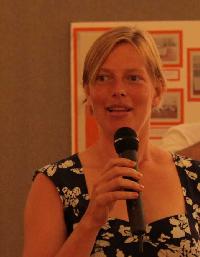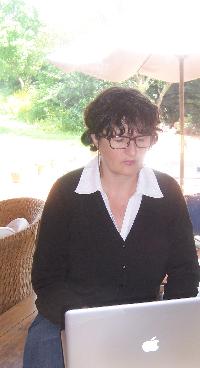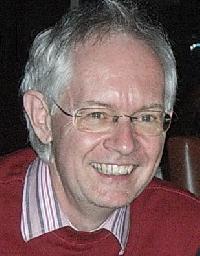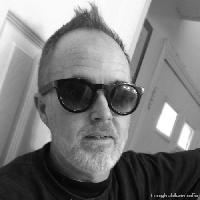| Pages in topic: [1 2 3] > | Poll: Do you have a license, certificate or degree in a profession outside of translation/interpretation? Thread poster: ProZ.com Staff
|
|---|
This forum topic is for the discussion of the poll question "Do you have a license, certificate or degree in a profession outside of translation/interpretation?".
This poll was originally submitted by Suzanne Deliscar. View the poll results »
| | | | neilmac
Spain
Local time: 07:56
Spanish to English
+ ...
A BA in Modern Languages (French and Russian). And, as I never tire of telling anyone who'll listen, or pretends to, I don't consider a specific degree in translation per se a prerequisite to becoming a translator.
Some of the stuff raised in "Translation Theory and Practice" is quite frankly beyond me and I struggle to see how it can be at all useful in hands-on day-to-day translating.
| | | | Ivana Didirkova (X)
France
Local time: 07:56
French to Slovak
+ ...
... a MA in Linguistics and I am about to continue my studies.
However, I would also like to have a degree / a certificate in a profession that has nothing to do with languages but have no time for it right now.
| | | | Marjolein Snippe 
Netherlands
Local time: 07:56
Member (2012)
English to Dutch
+ ...
| science degree | Jun 7, 2012 |
My PhD helps reassure some people I do know what I am doing.
It also gives me a bit more confidence than I think I would have had otherwise.
Of course, lots of translators without a PhD or other degree know what they are doing when translating science-related texts, but I think for specialised texts, a degree often helps.
| | |
|
|
|
Alison Sparks (X) 
Local time: 07:56
French to English
+ ...
and none of them related to language, unless you count an MLib as language related
Others (all professional) in music, business, secretarial, IT fields. All very useful in all sorts of ways. Like neilmac, I'm not sure a specific translation degree/cert would be particularly useful to me in the work I do.
In any case, at my age, I'm not going to start studying again thanks ... See more ... See more and none of them related to language, unless you count an MLib as language related
Others (all professional) in music, business, secretarial, IT fields. All very useful in all sorts of ways. Like neilmac, I'm not sure a specific translation degree/cert would be particularly useful to me in the work I do.
In any case, at my age, I'm not going to start studying again thanks ▲ Collapse
| | | | Julian Holmes 
Japan
Local time: 14:56
Member (2011)
Japanese to English
An Honours Degree in Japanese from the University of London 33 years ago
neilmac wrote:
Some of the stuff raised in "Translation Theory and Practice" is quite frankly beyond me and I struggle to see how it can be at all useful in hands-on day-to-day translating.
Hear, hear! I've seen course reading for undergraduates of these courses and it is complete gobbledegook to me as well and would probably cause more harm than good. 
@Alison
"In any case, at my age, I'm not going to start studying again thanks"
Actually, I'm thinking of applying for the DipTrans (Diploma of Translation) course with the CIOL (Charted Institute of Linguists) within the year just for the sheer hell of it. Just part of continued personal development -- learning is fun. 
Hmmm. I'm also interested in what a "degree in a profession" is.
| | | | Simon Bruni 
United Kingdom
Local time: 06:56
Member (2009)
Spanish to English
neilmac wrote:
Some of the stuff raised in "Translation Theory and Practice" is quite frankly beyond me and I struggle to see how it can be at all useful in hands-on day-to-day translating.
Having done an MA in Translation, I can confirm this to be utterly true. Much of the theory is purely academic and has little application to the everyday work of a translator. Translation Studies academics often (though not always) have an unrealistic view of translation, primarily because they are not bound by the time/money constraints of a jobbing translator and their status as university lecturers allows them to dictate both terms and method.
A classic example of this is the translation scholar Lawrence Venuti, who feels translators have some kind of almost moral obligation to allow something of the foreign to come through in translation. This completely disregards the fact that most clients simply don't want this and need for their purposes a text that reads like an original. But of course market constraints are irrelevant to Venuti because he already has a steady university job to pay the bills.
That said, on my particular course the lecturer was very aware of all of this, made students aware of it, and it was discussed at length. And the theory module did arrive at a genuinely helpful (and simple) model. Likewise, theory only accounted for 20% of the course.
[Edited at 2012-06-07 10:53 GMT]
| | | | | Translation theory......!!!!! | Jun 7, 2012 |
As Neilmac says:
Some of the stuff raised in "Translation Theory and Practice" is quite frankly beyond me and I struggle to see how it can be at all useful in hands-on day-to-day translating.
I bought a few of the recommended books to read for my diptrans, but quite frankly........ I wonder about the sanity of some of the writers. The only one that made any sort of sense at all was the Mona Baker book, if I remember rightly, and that was only interesting in a ver... See more As Neilmac says:
Some of the stuff raised in "Translation Theory and Practice" is quite frankly beyond me and I struggle to see how it can be at all useful in hands-on day-to-day translating.
I bought a few of the recommended books to read for my diptrans, but quite frankly........ I wonder about the sanity of some of the writers. The only one that made any sort of sense at all was the Mona Baker book, if I remember rightly, and that was only interesting in a very general way. The others are quite good for those suffering badly from insomnia, however, and for that, I can highly recommend them. ▲ Collapse
| | |
|
|
|
David Wright 
Austria
Local time: 07:56
German to English
+ ...
| A degree in law | Jun 7, 2012 |
I likewise do not really believe in the value of a degree in translation. It merely leads to a good number of graduates coming onto the market with perhaps a great deal of theoretical knowledge about translation but with very little knowledge of the real world as expressed in two or more languages and hence who need to spend quite some time familiarising themselves in depth with one or more specialised topics (which means more than just understanding the terminology and being able to translate i... See more I likewise do not really believe in the value of a degree in translation. It merely leads to a good number of graduates coming onto the market with perhaps a great deal of theoretical knowledge about translation but with very little knowledge of the real world as expressed in two or more languages and hence who need to spend quite some time familiarising themselves in depth with one or more specialised topics (which means more than just understanding the terminology and being able to translate it) before being able to really call themselves translators. ▲ Collapse
| | | | Simon Bruni 
United Kingdom
Local time: 06:56
Member (2009)
Spanish to English
| Practical focus | Jun 7, 2012 |
David Wright wrote:
I likewise do not really believe in the value of a degree in translation. It merely leads to a good number of graduates coming onto the market with perhaps a great deal of theoretical knowledge about translation but with very little knowledge of the real world as expressed in two or more languages and hence who need to spend quite some time familiarising themselves in depth with one or more specialised topics (which means more than just understanding the terminology and being able to translate it) before being able to really call themselves translators.
Not sure I fully agree with this. At least in the UK, the focus in MA courses is usually very practical. They even have modules on CAT tools and the such. Most of the content of the course I did was about language itself and more specifically the differences between languages.
| | | | jacana54 (X) 
Uruguay
English to Spanish
+ ...
| A degree in law | Jun 7, 2012 |
and I practiced the law as a criminal (and family) lawyer for over twenty years, besides collaborating with a university journal of procedural law. This is why I think that I am a near-native user of the language of the law.
Since changing careers I have, however, taken courses in translation and particularly in my target language.
Regardless of license, certificates or degrees, I'm sure that we all agree that the learning process never ends.
 ... See more ... See more and I practiced the law as a criminal (and family) lawyer for over twenty years, besides collaborating with a university journal of procedural law. This is why I think that I am a near-native user of the language of the law.
Since changing careers I have, however, taken courses in translation and particularly in my target language.
Regardless of license, certificates or degrees, I'm sure that we all agree that the learning process never ends.

[Edited at 2012-06-07 11:19 GMT] ▲ Collapse
| | | | Clara Chassany 
Finland
Local time: 08:56
Member (2012)
Finnish to French
+ ...
| Yes and I would keep studying if I could | Jun 7, 2012 |
First I got simultaneously a Bachelor's degree in Finnish Philology and a degree in Russian Philology, then I studied Art History during one year, after this I got a Higher National Diploma of Tourism and Leisure Management, and eventually started studying translation, subtitling, dubbing and videogame localization.
I would love to keep studying as there are so many fields I am interested in, yet a 24h day is way too short and money doesn't fall from the sky...
Of course I wil... See more First I got simultaneously a Bachelor's degree in Finnish Philology and a degree in Russian Philology, then I studied Art History during one year, after this I got a Higher National Diploma of Tourism and Leisure Management, and eventually started studying translation, subtitling, dubbing and videogame localization.
I would love to keep studying as there are so many fields I am interested in, yet a 24h day is way too short and money doesn't fall from the sky...
Of course I will keep studying languages, maybe start to learn a new one, and I am also planning on taking a course on technical translation and learning to use Trados (I use OmegaT but Trados is the one CAT tool agencies ask for).
I agree with previous posts, translation studies focus too much on the theory, whereas students should also be taught about practical aspects, like marketing, how to pay taxes as a freelancer, legal resources for unpaid jobs, etc. ▲ Collapse
| | |
|
|
|
gdesai 
Local time: 11:26
German to English
| A degree each in commerce and engineering | Jun 7, 2012 |
Experience is the best teacher and with more than 30 years in field and - on top of it - 15 translating, no qualification in translation required here.
| | | | Anthony Baldwin 
United States
Local time: 01:56
Portuguese to English
+ ...
| teaching cert., other degree | Jun 7, 2012 |
I have a certificate to teach 7th through 12th grade English and Language Arts.
I have a BA in English Language and Literature.
I taught English and Spanish for a few years before becoming a translator.
I was studying for a Master in Library and Information Sciences when I left teaching.
Likely even more alarming: I studied English (my native tongue) and French in college (a minor in French, but including graduate le... See more I have a certificate to teach 7th through 12th grade English and Language Arts.
I have a BA in English Language and Literature.
I taught English and Spanish for a few years before becoming a translator.
I was studying for a Master in Library and Information Sciences when I left teaching.
Likely even more alarming: I studied English (my native tongue) and French in college (a minor in French, but including graduate level courses, because I was like the 1 kid in the whole country who paid attention in high school French courses, and tested out of some 15 credits of French as an undergrad. Interesting side note and true story: I studied French because I thought it would get me laid. Kept studying because I liked it. Now, 25 years after graduating high school, I am dating the cutie I had a crush on in French class those 25 years ago! She found me on facebook after both of us had gone through years of marriage, divorce, etc.), but I have never studied Spanish or Portuguese academically/formally. Of course, I've lived speaking both Spanish and Portuguese for years of my life. I never lived with French this way, just have the academic studies. I "know" Spanish and Portuguese better than the French I studied at graduate level, because I lived with them. I think in them the same as I think in my native English. Now, being an English teacher and studying foreign language (French) makes me a good linguist, of course, and I did study, autodidactically, grammar, orthography, etc., on my own, in Spanish and Portuguese, but not one course in a formal academic institution for these 2 languages have I attended.
I interpret Spanish and Portuguese here in the US (ie. with English), and translate all three, ES, FR, PT to English.
I never studied law, but I did take the LSAT (Law School Admissions Test), and scored in the 97th percentile!
I was practically shanghai'd into PT/EN legal/court interpreting at a time when there was a demand, but little structure or oversight (and nobody else doing it) in the State, which launched my career as an interpreter, and brought me to proz.com (ah, one little google search changed my life!) to learn more about such work, which was pretty well the most significant impetus in the launch of my career as a translator.
Now, 7 years later, I have full confidence in my ability as a court/legal interpreter.
I took on legal translations based on that experience.
Now, listen: I also do technical/IT related translation, software and web localization, which is another field in which I have absolutely no formal education.
I have never taken a course in computer science, programming, IT, anything tech related.
But, again, I taught myself to program computers, build websites, and administer gnu/linux systems, as well as build a computer system from components. I know hardware and software. At this point I have released a good handful of programs to the free/libre open source software community (see http://tonybaldwin.me/hax ), including some translation project management tools, and other stuff. This got me work translating and localizing materials (software, documentation, manuals) within the FLOSS community, providing experience that I use in providing the same services professionally.
I now have full confidence in my abilities as an IT translator and software localizer.
Bringing those two fields together, I do many IT+Law translations (ToS, patents, patent applications, patent litigation briefs, technical specification, technical services contracts, etc.)
When I first went to college, I had a scholarship to study sports medicine, kinesiology, orthopedics and biology, which I studied for only one year before changing to an English major (English was more challenging and interesting. Seriously.)
I studied 9 hours of psychology, 6 hours of biology, 6 hours of nutrition, etc. 1 year of undergrad studies to prepare for a medical degree before switching to studying old dead poets and the history of language!
The demand for interpreting in medical settings was as large as the demand for legal interpreting when I started, so I took many medical consultation interpreting jobs, as well, and now, I take on some medically related translations, as well.
The first was related to diabetes medication (and I am diabetic).
I worked in construction, painting, masonry, etc., while putting myself through college. I briefly ran my own painting contractor company after teaching and before becoming a translator. I use this experience to also translate construction and related contractual materials, as well.
So, technically speaking, I DID study language (but not translation). I developed excellent research skills, on my own, in my studies of literature, and, especially, in studying for the MLIS. I am and always have been a voracious reader and curious absorber (sponge) of knowledge on a broad variety of topics (also very much an astronomy enthusiast, for instance).
Not surprisingly, I also taught myself to play guitar and other instruments, to paint, and to do photography (at www.tonybaldwin.me you can find my art, photography, and music, as well).
[Edited at 2012-06-07 12:00 GMT]
[Edited at 2012-06-07 12:02 GMT]
[Edited at 2012-06-07 12:04 GMT]
[Edited at 2012-06-07 12:21 GMT]
[Edited at 2012-06-07 12:22 GMT] ▲ Collapse
| | | | Julian Holmes 
Japan
Local time: 14:56
Member (2011)
Japanese to English
@Tony Baldwin
Great post and excellent read. Proof that old-fashioned hard work and dedication will produce the right results without formal certification whatever you want to do if you're highly motivated (liked the motivation for studying French. Improved my Japanese tremendously, too  ). ).
Looking forward to more raw posts like this!
| | | | | Pages in topic: [1 2 3] > | To report site rules violations or get help, contact a site moderator: You can also contact site staff by submitting a support request » Poll: Do you have a license, certificate or degree in a profession outside of translation/interpretation? | Protemos translation business management system | Create your account in minutes, and start working! 3-month trial for agencies, and free for freelancers!
The system lets you keep client/vendor database, with contacts and rates, manage projects and assign jobs to vendors, issue invoices, track payments, store and manage project files, generate business reports on turnover profit per client/manager etc.
More info » |
| | Anycount & Translation Office 3000 | Translation Office 3000
Translation Office 3000 is an advanced accounting tool for freelance translators and small agencies. TO3000 easily and seamlessly integrates with the business life of professional freelance translators.
More info » |
|
| | | | X Sign in to your ProZ.com account... | | | | | |













